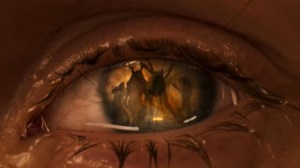While The CW has quite a few superhero shows in its programming lineup, Black Lightning stands apart from the rest and not just because it’s not a part of the Arrowverse the other series are part of. The series focuses on a black hero, in a predominately black community, and doesn’t shy away from the issues that come along with that.
Videos by ComicBook.com
And its that willingness to explore the issues as well as celebrate the black community on the whole is an integral part of Black Lightning, according to the cast and crew. During the show’s panel at San Diego Comic-Con last weekend, much of the discussion about the series centered on the issue of representation and why it matters so much, not just on Black Lightning, but in entertainment on the whole.
From the importance of portraying African-American heroes to inspiring next generation, read on for the cast and showrunners thoughts about representation on Black Lighting.
On humanity and the show’s family focus

One of the things that is special about Black Lightning is that it’s not just a superhero drama, but a family show as well. Central to Black Lightning is the Pierce family and their dynamic and relationship. When audiences meet the Pierces, Jefferson (Cress Williams) and Lynn (Christine Adams) are divorced but are raising their daughters, Anissa (Nafessa Williams) and Jennifer (China Anne McClain) as a united front. For series co-creators Salim Akil and Mara Brock Akil, it was important that the show portrayed a loving and united family.
“We haven’t seen many African-American so-called superheroes, and I think making a family drama, you’re able to explore our humanity, Akil said. “In a season, there’s an attempt to divide us. I think shows like this try and pull us together.”
On celebrating culure

Brock Akil took the idea of the show’s exploration of family a step further and said that Black Lightning served as a celebration of culture as well as a reminder of the importance African-American culture has to the overall fabric of American culture.
“I think celebrating our culture is important to remind us that we are also part of the American culture,” Brock Akil said. “I think it’s important to know its origin… What we have gone through as a people… to show our humanity in that journey. I love how we mentioned the Tuskegee experiment. Tracing our history and our path is important.
“I”m also very excited to show what’s really happening in our neighborhoods. There is a lot of just everyday people. They’re the everyday heroes surviving what’s happening in these neighborhoods. Putting our families back together is part of the history we’ve been trying to repair since slavery.”
On representing a young, lesbian hero

Outside of the direct family dynamic of the Pierce family, Black Lightning as a hero is also a family affair. Both Anissa and Jennifer have inherited metahuman powers, something that Anissa embraces right away as the hero Thunder. For Nafessa Williams, portraying a lesbian hero is important and she’s gotten a lot of encouraging feedback from young lesbian fans.
“Representation is important,” Williams said. “That’s my only job as an actor: to take on jobs that are going to inspire. We gotta be who we are unapologetically.”
On representing black women as heroes

It’s not just the Pierce daughters and their metahuman powers that are heroic on Black Lightning, either. Lynn isn’t a metahuman, but she is just as involved in the fight, especially by the end of the first season and, according to Brock Akil, showing women being front and center of the fight was important in making Black Lightning.
“Black women have always been at the forefront of the battle,” Brock Akil said. “What’s beautiful and what’s necessary about that project when it came along was yes, we wanted to be part of reflecting that on television, that which is often overlooked, which is often invisible. We need to embrace our daughters. We have a lot to fight, but we don’t want to leave our little girls out.”
On why Black Lighting specifically

Outside of the importance of family, culture, and representing women, Akil was also asked specifically why Black Lightning was important and the answer was simple: it’s time.
“Why black lightning? Because I think it’s time,” Akil said. “I think Jefferson Pierce is the epitome of what black men are. He is a man who is in love with his wife, he loves his children, he loves his community, so this family is like the Obamas of the superhero world.
“I think that the thing that makes it so timely is that you know when we look on the news and we see that there’s 125 shootings in Chicago over a Fourth of July weekend there are no superheroes going into that neighborhood trying to save people well Black Lightning is going to go do that so I think why we need him.”
On inspiring the next generation

For Akil, Black Lightning is also about inspiring the next generation. The showrunner said he wants to see children of all races and ethnicities comfortable being heroes in a way he wasn’t as a child.
“I remembered looking in the mirror, feeling very proud. I remember realizing that the face didn’t match my hands,” Akil said. “I really wanted to be authentic… the solution was that my mother gave me gloves. I never, never want another young black girl or black child to have to hide their skin again to be a hero… What’s beautiful is that, just today, LEGO presented us with a LEGO of Black Lightning and that will be in the culture hopefully forever.
“The only other reward I’m looking for from this show… is I can’t wait for Halloween to come this year. If I can see little brown boys and little brown girls and little white boys and little white girls dressed up as Black Lightning and Thunder, I think it would be amazing for American culture.”
‘Black Lightning’ will return this fall
Based on characters from DC, Black Lightning was created for television by Salim Akil. The show comes from Berlanti Productions and Akil Productions in association with Warner Bros. Television with executive producers Greg Berlanti and Sarah Schechter (“Arrow,” “The Flash”), Salim Akil & Mara Brock Akil (“Being Mary Jane,” “The Game,” “Girlfriends”) and Eric Wallace. Black Lightning was created for DC Comics by Tony Isabella with Trevor Von Eeden.
Black Lightning returns for its second season this fall, airing on Tuesday nights at 9 p.m. ET/PT after The Flash on The CW.








